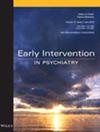Impact of a family history of mental disorders on the characteristics of patients with early psychosis
Abstract
Aim
Children of parents with psychiatric illness have a higher risk of developing psychiatric disorders. This is particularly the case for psychoses and the evolution of these disorders could likely differ. The aim of this study was to study the impact of a first-degree and second-degree family history of psychiatric disorders (FHPD) on the characteristics of patients with early psychosis in a specialized programme.
Method
This research is a prospective study based on 408 patients aged 18–35 years enrolled in the Treatment and Early Intervention in Psychosis Program (TIPP) with a three-years follow-up. Various characteristics were compared between patients with first-degree-FHPD and those without, then between patients with 2nd degree-FHPD and those without. The influence of the number of parents with first or second degree FHPD on clinical characteristics was also studied.
Results
Our results showed an influence of FHPD on the characteristics of patients presenting a first episode of psychosis. Over the 3 years of follow-up, patients with at least one second-degree relative showed more negative and depressive symptoms and poorer general functioning than patient who did not. The number of parents with first or second degree FHPD was also negatively associated with several clinical variables.
Conclusion
The results of this study confirm the existence of a distinct premorbid profile and a different evolution in patients with FHPD, which is not limited to first-degree relatives. This suggests the importance of specific needs that should be addressed during treatment.


 求助内容:
求助内容: 应助结果提醒方式:
应助结果提醒方式:


